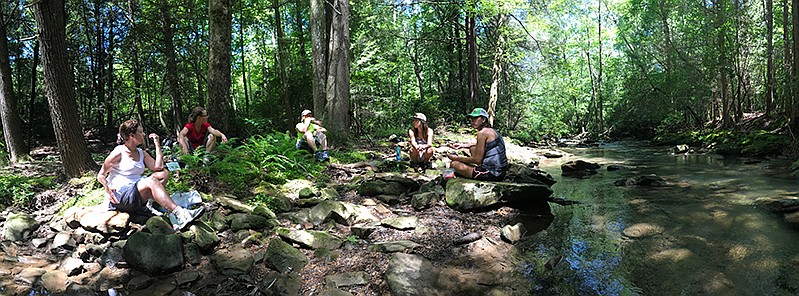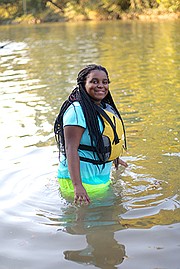In their own words
We asked some local women to reflect on their time spent outdoors and share what nature means to them. Here are their responses.Jenny Baker, 36, says, “There’s no better place to teach our girls to be capable and to believe they are capable. When my daughter climbs, she sometimes gets into difficult places, and I can work with her, coach her and help her be confident and realize she is strong and smart. She is a problem solver and what she learns outside will translate into the real world. … When I run with women, and camp with them; when I’m in the outdoors with them generally, I find we are all in a place of vulnerability where we genuinely see each other for who we are. In the outdoors, we can be our true selves and connect with each other about our failures, and we can celebrate our successes. There are no statuses, and that level of equality is so attractive in a culture that labels everything.”Stephanie Wilkins, 47, says, “When I started climbing as a young adult, my whole outlook on nature changed. Having a vertical perspective allowed me to see the world differently and it gave me a completely different mindset about what was possible. The sport was predominantly male in Birmingham. In Chattanooga, there’s a whole community of men and women I can climb with.”Kellye Tilford, 29, says, “In the seventh grade, I went to camp at an outdoor, Christian, adventure camp deep in the hill country of Texas — a place where rolling hills looked like mountains to my untrained eye. We were hours from civilization and at night you could see stars. Like, really see them, as if you could reach up, touch them and dance with them. I felt deep inner-peace in this isolated heaven on earth. It became a home for my heart.”Hannah Elrod, 34, says, “I’ve never felt hindered by being a female, but how you see yourself in the world can be impacted by the people around you. … You can be female and be strong and capable. … When you find a group of women who are encouraging, it makes everything better. … Anytime we’re motivated or limited by fear, we’ve lost before we started.”
More Info
To learn more about becoming an “Outdoor Girl” or volunteering to help, contact Toccora Johnson at tjohnson@girlsincofchatt.org.
As a little girl, my parents - but mostly my mother and her friends - guided me in the outdoor world. Our outings were on the trails in the high country of Colorado, where I learned to read a map, identify plants and animal tracks and to pack for any weather.
Through my childhood, I hiked, skiied and backpacked. In my teens, I added rock climbing and trail running. I didn't know anyone who was trail running back then, but it seemed to be the natural extension of my love for the outdoors. I felt, and continue to feel, empowered every time I go outside.
When I first moved to Chattanooga in 2002, it was rare that I saw anyone on the trails on Lookout Mountain. And when I did see someone, it wasn't a woman. Over the years, though, women's participation in Chattanooga's outdoor scene - and in the country's at large - has grown.
In fact, a 2017 national survey sponsored by outdoor retailer REI polled more than 2,000 women about their outdoor experiences. The findings showed that regardless of age, education, ethnicity, marital status or profession, women not only love the outdoors, but they derive a sense of well-being from being outside.
As more and more women embrace the outdoors, Chattanooga is embracing the trend with a number of new initiatives designed to help bolster these burgeoning communities and inspire the next generation of outdoor women.
Wild Women Outdoors
After moving back to Chattanooga from time in Montana, Wyoming and Hawaii, Laura Schell and her sister Mary Burn started Wild Women Outdoors, a meetup-style organization whose mission is to cultivate a community for women who love to be outdoors.
"When I came back, women kept asking me to go backpacking or mountain biking or to plan trips for them and their friends so they wouldn't have to go alone," Schell says.
The idea of Wild Women is to organize female-only group hikes, camps, paddles and more. The events take place throughout the month and the particulars of each trip, including its description, location, duration and a list of items to bring, are publicized on Facebook and Instagram. Cost for each trip ranges from $10-$25, though sometimes more, depending on the activity.
The demographic for outing candidates is, literally, any woman who wants to be outdoors, regardless of her skill level, say Schell and Burn.
Recently, two women in their 60s signed up for a hike with Wild Women Outdoors, and as Schell relates, it was evident that they were unsure about the situation.
"They had a 'what have I gotten myself into' look about them, but we took them to a big swimming hole out in the middle of nowhere and everyone ended up having a great time," Schell says.
At the end of the trip, that pair couldn't stop talking about coming back with their friends - which is exactly what Wild Women hopes to do: grow the local community of outdoor women.
Eventually, Schell and Burn hope to add an educational component to their events, such as inviting people with expertise in particular areas to join or lead outings.
Meanwhile, a partnership between two other local organizations is helping to inspire the next generation of wild women.
In August, Girls Inc. of Chattanooga, an organization dedicated to helping raise strong girls, was awarded $12,000 through REI's Force of Nature grant, which gave more than $1 million this year to established partners and new initiatives to support gender equality in the outdoors.
News of that award came on the heels of Girls Inc.'s Title IX summer camp honoring the anniversary of the Education Amendments of 1972, a suite of reforms to higher learning that include Title IX and prohibit gender discrimination in any federally funded program.
During that camp, girls participated in different sports and outdoor activities, and learned how to be safe while doing them. Another component of the camp, says Girls Inc. program coordinator and online communications manager Abbey Rice, was called "Girls in Action." It invited girls to participate in outings such as a duck boat tour on the Tennessee River, a hike at Lula Lake, and to offer support during the Chattanooga Mountains Stage Race, a three-day trail running event. The girls passed out drinks, cheered and helped with finish line activities.
Through the camp activities and community engagement, girls learned character traits like resilience, proactiveness and outdoor etiquette - and thanks to REI's funding, those efforts could continue.
In September, in partnership with Outdoor Chattanooga, Girls Inc. initiated the Outdoor Girl after-school program. Comprised of girls in grades 6-8, the group meets Mondays and Tuesdays to explore diversity topics, develop leadership skills and work on a community project: a summit where they will advocate how to educate and get their peers, parents and other Chattanooga families to explore various outdoor opportunities.
Toccora Johnson, senior director of program operations for Girls Inc. of Chattanooga, says, "There's a stereotype that girls don't like to sweat, or get dirty, or see bugs. But we've seen this isn't true. Girls Inc.'s three values are to be smart, strong, bold, and all the skills the girls learn in the program intentionally embrace and promote these ideas."
Outdoor Chattanooga's Sunshine Loveless says, "We're teaching the girls insect and plant identification, how to pitch a tent or read a map, how to choose the right trail for the amount of time they have available, how to be prepared for the weather to change. Ultimately, they're learning practical skills that involve thinking about the bigger picture and can be applied in real life."
For instance, Loveless, a former whitewater raft guide, remembers when she first began her training on the river.
"I was terrified because I was in a cold environment I didn't know how to dress for, and I was in pain," Loveless says. She had wanted to quit that first day, but instead she took the advice she had been given about how to properly dress, and her second day was better. She not only completed the training, but ended up working as a raft guide for years.
"When I saw what was possible, I pushed myself to do it. And when I succeeded, I was proud of the effort I put into improving. It gave me confidence to experience other activities," Loveless says.
And having confidence in the outdoors is key.
"Confidence is the No. 1 bonus, because they overcome a fear or a bias and their world opens up a little bit more," says Outdoor Chattanooga's Terri Chapin. "Each outing gives them the confidence to take when they go into the outdoors again or to take another new person out with them."
Since the program began, the girls have traveled to Booker T. Washington State Park to learn about birds of prey. They visited Audubon Acres where they learned about the watershed from Kids for Clean Water founder Mary Beth Sutton. They went hiking at Enterprise South Nature Park - an adventure that initially seemed overwhelming for the girls because it was raining, hard. Some were hesitant about getting out in the wet, but they had rain jackets and were encouraged to give it a try. Once they got out of the van, the rain stopped, and over the course of the outing the girls learned how to use a map and read the signs in the park, thus turning the event into more than just a walk through the woods.
Loveless remembers one seventh-grader who was particularly apprehensive during a canoe trip through Outdoor Girl. The youngster was frightened of the water despite Loveless' assurance that the water was only waist-deep and reminder that the girl had a life vest and trained professionals were present. It wasn't until Loveless pointed out how much fun the girl's friends were having that she gave in.
" Before long, she saw her fear of the unknown wasn't as big as her desire to try something new that her friends were enjoying," Loveless says.
Rice says she hopes this is a lesson all the girls will carry with them for the rest of their life
"Maybe one of the girls will be intimidated to ride a new bus this semester; maybe they will be nervous to try out for the school soccer team later this year; or maybe they'll be fearful of an overnight college visit in the next few years. The goal is for each girl to experience future moments of 'OK, I'm afraid right now, but maybe this will actually turn out OK. Just like that time I was afraid of canoeing and of drowning but it all worked out in the end and I had a blast,'" says Rice.
"We grow up in a complicated society and we forget to play and to enjoy being outside," says Chapin. "But if we can help these girls learn to find their way in the outdoors with problem solving skills and confidence building experiences, we've succeeded in our goals of helping them find their way in the world."

